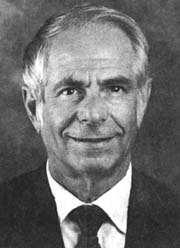One important area of NIDA research is to investigate factors associated with drug use in communities, as demonstrated by MERIT Award winner Dr. David N. Nurco of the University of Maryland School of Medicine. Dr. Nurco's work focuses on drug abuse prevention and treatment with inner city children and their families in Baltimore. He expects to gain new understandings about the causes of drug abuse, including the influence of drug-using peers.
 Dr. David N. Nurco
Dr. David N. NurcoDr. Nurco's latest research is examining vulnerability to narcotic addiction. "Why do some people become addicts and others do not?" he asks. Answers are being sought in local communities through a retrospective study of three groups of males closely matched by age, neighborhood, and race. An early observation: The friendships children form at age 11 reveal a great deal about whether they will grow up to become narcotic addicts. Specifically, adolescents are more likely to become narcotic addicts if their childhood friends drink alcohol, use illicit drugs, and commit crimes.
The study, which is being conducted at the Northwest and East Baltimore Youth Service Bureaus, builds on 30 years of research into better ways to prevent and treat drug abuse. Most of Dr. Nurco's work has been carried out in Baltimore. His research provides a rich portrait of drug-taking patterns, police and court practices, and the growth of treatment facilities.
Looking back on his research, Dr. Nurco says, "We started with the basic notion that if you want to interrupt a behavior, you have to understand it."
This notion led to a string of major findings. For example, his studies have helped document the relationship between drugs and crime. As he pointed out in a 1992 lecture at the Center for Substance Abuse Research at the University of Maryland at College Park, "While nearly all addicts commit crime while addicted, only slightly over half commit crime prior to addiction or during subsequent periods of nonaddiction." Further, "The most serious criminals among addicts were found to be those with the earliest onset of narcotic addiction."
Dr. Nurco's early research included the Maryland Drug Abuse Study conducted in the late 1960s. This study was a series of exploratory investigations involving more than 130 agencies and schools. It provided an in-depth look at drug abuse as a public health problem.
"One finding was that principals and teachers were reluctant to admit that they had drug problems in their schools out of fear that they would be blamed for it," says Dr. Nurco. "We were able to obtain a much clearer idea of increases in the numbers of people with drug problems and the numbers of contacts with the police. We also documented what was known and what was not known about drug abuse at the time. There was an abysmal ignorance about the problem."
Not all of Dr. Nurco's research has focused on Baltimore. During the Vietnam War, at the request of the White House Special Action Office for Drug Abuse Prevention, Dr. Nurco helped design a study of drug use among American soldiers in Vietnam. Dr. Nurco and Dr. Lee Robins, the project's principal investigator, undertook the study to address Nixon administration concerns that American soldiers were becoming addicted to narcotics in Vietnam and continuing their addiction when they returned to the United States.
The study determined that 43 percent of U.S. Army enlisted men in Vietnam used narcotic drugs, and 20 percent were addicted. However, only a negligible percentage of these soldiers were addicted to drugs 8 to 12 months after returning home.
Dr. Nurco's perspective on drug abuse arises naturally from his background in social work. He received his M.A. in social work from the University of Connecticut and his D.S.W. from the National Catholic School of Social Service in Washington, D.C. After spending several years as a social work clinician, including a position to establish a Big Brothers agency in Annapolis, Maryland, he became assistant director of mental health planning for the Maryland State Department of Health and Mental Hygiene.
